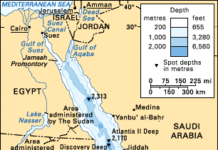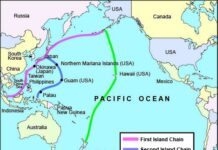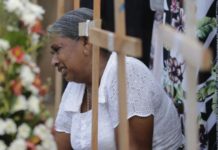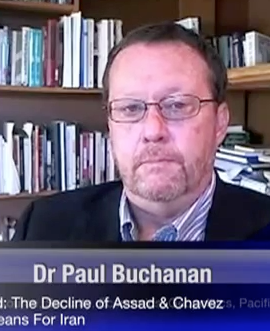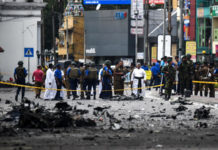The Papua New Guinea Crisis – Australia and New Zealand’s Challenge
Weekly Analysis – By Selwyn Manning.
Concerns that civil unrest may flare inside Papua New Guinea have intensified in the past two months as lines of division within PNG’s legislature, judiciary, and security apparatus worsen. New Zealand’s High Commission in Papua New Guinea is monitoring political developments and the security situation in PNG closely.
The New Zealand Ministry of Foreign Affairs and Trade (NZMFAT) advises New Zealanders that there is ‘some risk’ to their security in Papua New Guinea due to the potential for civil unrest to flare. The advice notes that political tensions may increase as Papua New Guinea’s elections draw closer. Although contacts in the capital Port Moresby have told 36th Parallel that tensions have eased since PNG Prime Minister Peter O’Neill announced that a general election will be held in June, the possibility of street violence cannot be discounted.
At this juncture, if civil unrest breaks out, neither New Zealand or Australia have plans to protect their diplomatic and private enterprise assets inside PNG. In answering 36th Parallel’s questions on this matter NZMFAT replied: “The High Commission is not taking any special security precautions at this stage but is keeping a close watch on developments.” However NZMFAT did advise New Zealanders living in, working or visiting the Melanesian country to avoid large gatherings “due to the potential for violence”, and to monitor local events closely. They are also advised to maintain a “high degree of security awareness” and should register with NZMFAT on www.safetravel.govt.nz.
Politically, the situation between Papua New Guinea and Australia is delicate. Consequently, at this juncture any maneuvers taken by Australia, and secondly by New Zealand, to ‘assist’ PNG to quell unrest and protect ANZ personnel are diplomatic rather than operational in terms of a security.
Election Date A Bone Of Contention:
 After months of indecision and procrastination by Papua New Guinea’s leadership, Prime Minister Peter O’Neill announced on April 27 that PNG’s General Election will be held as scheduled in late June or early July 2012. The announcement eased tensions among rival political factions and Prime Minister O’Neill avoided a national strike after he met with trade unionists, non-governmental groups and student representatives to deliver the promise that elections would indeed be held.
After months of indecision and procrastination by Papua New Guinea’s leadership, Prime Minister Peter O’Neill announced on April 27 that PNG’s General Election will be held as scheduled in late June or early July 2012. The announcement eased tensions among rival political factions and Prime Minister O’Neill avoided a national strike after he met with trade unionists, non-governmental groups and student representatives to deliver the promise that elections would indeed be held.
It appears help is at hand. In April Australia announced it had provided 30 Australian workers to assist PNG to meet electoral roll requirements and to help run the elections. Australia’s Foreign Minister Bob Carr then defined this as “serious assistance” and that contributions to PNG to meet its election deadline would be considered to be development aid. The United States has also committed aid to assisting with voting logistics in the country’s interior and remote areas.
The backdrop to O’Neill’s promise is interesting. As recent as April 5, Papua New Guinea’s Parliament voted 63 to 11 to postpone elections. This was contrary to the Australian Government’s advice to the PNG government. Fearing a postponement would incite unrest, even widespread violence, Bob Carr and Prime Minister Julia Gillard cautioned O’Neill against delaying elections. In the Australian view to do so when hostilities were escalating between divisive political and ethnic groups would be folly.
The advice was interpreted by Papua New Guinea’s leaders, at least publicly, as meddling in their domestic affairs. Most vocal was PNG’s Deputy Prime Minister Belden Namah, who was outraged in March when newly appointed foreign minister Carr stated that if PNG failed to hold a General Election as scheduled then Australia would contemplate sanctions. That drew an understandably terse reply that Papua New Guinea’s leadership, not Australia, would decide when it went to the polls. This in turn caused Carr to respond via the press stating: “We respect their sovereignty but we’ve got a commitment to seeing that countries in this region stick by a democratic formula, the old formula that says that people determine their rulers and they do it on a regular basis.” On April 20, Prime Minister Gillard phoned O’Neill and spoke about the importance of holding the General Election on time in accordance with PNG’s constitution (ABC, April 23). O’Neill publicly stated to ABC: “We appreciate the support of the Australian Government, but again it’s for us to determine where we go with the elections in the coming months,” he said.
Sensing that O’Neill was nevertheless warming to Australia’s argument (his party had begun campaigning) and that an election date would indeed be forthcoming, Australia eased off on its public campaign in favor of a specific timeframe for elections.
The soft approach helped bring O’Neill’s government forward from its position in early April. At that time O’Neill’s government said that electoral rolls were not ready and the delay would give the electoral commission time to complete them. There was a massive public outcry and a large protest in Port Moresby with many people seeing it as an attempt to hang onto power. Mr O’Neill subsequently backed away from the delay and admitted neither the government nor parliament had the power to defer the election.
On April 27, O’Neill capitulated to threats that unless he announced an election date a national strike would occur.
In a statement O’Neill assured elections would be held in June: “”I assure all Papua New Guineans and our international partners that this government stands ready to deliver a free and fair election,” O’Neill said. He added: “The motion in parliament to defer elections for six months was an expression of frustration by members of parliament at the electoral commission’s failure to have the common roll updates ready on time.”
As it turns out, with that excuse O’Neill saved face over the issue and Canberra was reassured that polls will be held as scheduled.
There is massive interest in the General Election with 4,329 candidates having signed up to contest the election (RNZI, May,2). This figure is expected to increase once PNG’s Electoral Commission concludes collating candidate data from all political parties.
This heightened interest in politics by Papua New Guineans is connected to how this election will draw deeply estranged factions to the fore, and how these competing interests will respond to the outcome. In normal election campaigns the intensity of argument is ratcheted up considerably, but, in PNG in 2012, instability and unrest is more acute than at any time since the Julius Chan leadership period of 1994 to 1997. Back then, Papua New Guinea teetered on the brink of civil war. Political interest and risk are sometimes common bedfellows, and the 2012 election is no exception.
Why Papua New Guinea Is So Important:
 There is much at risk should disorder flare inside Papua New Guinea. It has a population of nine million, and its government apparatus and business elite are slowly developing. Its gold, oil and gas reserves have attracted multinational exploration and exploitation interests that have established large scale ventures inside PNG. The expectation is that new mining and extraction technologies will unlock vast reserves of natural resource and mineral wealth previously unreachable. Mining operations are expected to return billions to the multinationals and Papua New Guinea over the next decade.
There is much at risk should disorder flare inside Papua New Guinea. It has a population of nine million, and its government apparatus and business elite are slowly developing. Its gold, oil and gas reserves have attracted multinational exploration and exploitation interests that have established large scale ventures inside PNG. The expectation is that new mining and extraction technologies will unlock vast reserves of natural resource and mineral wealth previously unreachable. Mining operations are expected to return billions to the multinationals and Papua New Guinea over the next decade.
PNG’s former colonial overseer, Australia, has invested more in it more than any other nation. Its dilemma is how to protect that investment while maintaining effective and reasonable relations with its northern neighbor. At this stage, as a measure against unrest escalating into disorder and civil violence, Australia’s tactic is diplomatic and political rather than operational. As New Zealand foreign affairs officials told 36th Parallel, should unrest flare in PNG: “There are no plans for a regional response (similar to RAMSI) in PNG at this time.”
Background: When Aid Is Not Enough:
Australia’s relationship with post-independence Papua New Guinea has always been strained. Annually, Australia transfers hundreds of millions of Australian taxpayer dollars to PNG. It does so via its overseas development aid funder AusAid. Papua New Guinea welcomes the funds, relies on it, but insists that it prioritize where the funds be spent.
In 2011 to 2012 Australia will have injected A$482.3 million (Australian dollars) via AusAid into Papua New Guinea. More generally, in the fiscal year ending June 30 2012 the Melanesian region will have received A$851.5 million worth of overseas development assistance from Australia.
Beyond Melanesia, Australia invests a total aid budget of A$4.8 billion on 2011-12 estimates. Around half of this total is transferred to countries in the Asia/Pacific region. The top ten bilateral aid recipients for 2011-12 are Indonesia, Papua New Guinea, Solomon Islands, Afghanistan, Vietnam, East Timor, Philippines, Pakistan, Bangladesh and Cambodia.
The Australia Federal Government states that “(r)educing poverty is in our national interest. Poverty breeds instability and extremism and creates conditions that lead to more refugees, as people flee from violence or hardship. Most of the developing countries in our region are also important trading partners for Australia. It is for these humanitarian, national security and economic reasons that the Government remains committed to increasing our aid to 0.5 per cent of our Gross National Income by 2015-16.” (AusAid, 2011.)
Former Australian Minister of Foreign Affairs, Kevin Rudd, wrote in a 2011 Treasury document that: “Aid is achieving results and saving lives. Since 2009 we have helped immunize 900,000 children in Papua New Guinea against measles and other diseases…” More generally, humanitarian aid is a means for Australia to contribute to the world’s second largest island nation’s development while promoting regional stability and a degree of influence over PNG’s extra-territorial interests – including its position over West Papua and the territorial sea limit in Torres Strait, known as the Australian Fisheries Jurisdiction.
Clearly aid has its limitations, and there are problems with how Australian aid is spent in Papua New Guinea. Canberra requires AusAid funds to be targeted to specific development projects, that the funds be assessed on a cost-benefit evaluation – that each dollar’s journey from AusAid coffers to ground-zero in Papua New Guinea be openly accounted for. The problem for Canberra is that Papua New Guinea is reluctant to allow Australia to dictate the specifics of how the money is used. That poses some troubling questions.
This week Radio Australia revealed that pockets of Australian aid money to PNG was used to set up private armies. It was revealed by an Australian academic, Dr Andrew Lattas, who works in Europe at the Department of Anthropoloy, University of Bergen, that AusAid funds were used by the Papua New Guinea government to set up private armies for the purpose of deploying armed security squads to protect Malaysian logging interests. That illustrates the lack of transparency over how aid money is spent and how far Papua New Guinea needs to develop before progressive trusted relations with its southern neighbors is achieved. Here respect for PNG sovereignty runs counter to the appropriate and efficient allocation of Australian humanitarian aid.
When Pressure Is Applied From Multiple Sources:
As 36th Parallel has assessed, Papua New Guinea’s crisis is institutionalized and has ruptured its political, judicial and constitutional fraternities. This issue has intensified since September 2011 after current Prime Minister Peter O’Neill seized his opportunity to take leadership of the PNG legislature away from then-Prime Minister Sir Michael Somare. (See, Is Papua New Guinea A Failing State?)
Peter O’Neill’s leadership coup was made possible due to Grand Chief Somare’s failing health. In August and September 2011 Sir Michael was hospitalized in Singapore after a heart problem, and on discharge was seen to be fragile and unlikely to have enough fight left in him to challenge O’Neill and re-take the leadership. If that was Peter O’Neill’s assumption then it backfired. On returning to Papua New Guinea Somare regained his zest for leadership and has since rekindled support from loyalists and influential people within the political apparatus, the judicial fraternity, the police, and factions within the armed forces.
Peter O’Neill has discovered, as others have found, that the Grand Chief Somare (pictured above/left) is a formidable foe.
Papua New Guinea, once the sole dominant state within the Melanesian group of nations, has seen Fiji under its military leader Commodore Voreqe (Frank) Bainimarama (an ally of Sir Michael Somare) ascend as the lead nation within the Melanesian Spearhead Group (MSG).
This degradation of status, which on examinaton is likely to be short-lived, is an added pressure on O’Neill. His attempt to postpone elections backfired. He sought time to solidify his support-base but now as to contend with electoral competition. The General Election will determine his fate. If he wins at the polls, O’Neill will herald a new era for PNG, including closer relations with Australia and renewed efforts to establish adherence to good governance principles.
O”Neill’s relationship with Australia is a thorny issue in PNG. O’Neill enjoys the favor of Australia and by default, New Zealand. That is problematic for O’Neill because Papua New Guinea and the wider Melanesian region is experiencing a rise in nationalistic interest born from a cultural desire to achieve true independence from its rich, white, southern neighbor.
When he first took office O’Neill was seen as loath to get offside with Canberra. More recently was keen ‘to be seen’ to stand up to Australian demands. Now he has backed down and accepted Australia’s advice on holding elections. Insiders tell 36th Parallel that in private O’Neill is an impressive strategic thinker, but there is a public perception, at least in some influential quarters, that he appears indecisive, committing to a plan only to reverse his decision a little later on. To illustrate this, it has been pointed out that since O’Neill took office PNG has been nothing short of erratic in its revolving door approach to diplomatic appointments. O’Neill appears to be pulled in numerous directions–he needs to keep his supporting coalition intact and in a dominant political position, but he also needs to maintain the trust and support of Australia, New Zealand and Fiji in site of the tensions between them. Then there is the pressure to appear strong, staunch and independent. Those in foreign affairs circles speak of other new politicians with leadership potential. They also speak of how the wily Grand Chief Sir Michael Somare’s era has passed. But whoever may be lurking in the wings, for the moment O’Neill is Canberra (and thus Wellington)’s preferred man.
Futures Forecast: Growing short term instability, with possible civil unrest flaring in the lead up to and immediate post General Election period of late June early July.
Stability Score: 4 (low). Stability scores range from 1 (very low) to 10 (high). Papua New Guinea has a low score of four because continued investor confidence and interest in raw material extraction partially mitigates the impact of the political crisis.
- 36th-parallel.com Analysis – Is Papua New Guinea A Failing State?
- 36th-parallel.com Dispatch – Fiji Regime’s PPP Defence Commercial-Arm Targets MSG States
- 36th-parallel.com Analysis – Melanesia’s Leaders Approve Security Force Position MSG Bloc To Interact Directly With Global Bodies
- 36th-parallel.com Analysis – Melanesia’s Leaders Approve Security Force – Security Level-B
- Summary of Australia’s Overseas Aid Program 2011-12, AusAid, Australian Government (Click here for pdf)
- AusAid – Purpose of development aid assistance
- Australia Treasury, Budget 2011: Australia’s International Development Assistance Program 2011-12, (Click here for pdf)
- AusAid – Transparency Charter
- NZ Herald, April 6 2012 – (AAP Report)
- Radio Australia – Pacific Beat – Australian Aid To PNG Training Private Armies.
- Bond University – Offshore exploration and production, policy and the Offshore Petroleum Act: Whither now? (Click here for pdf)


